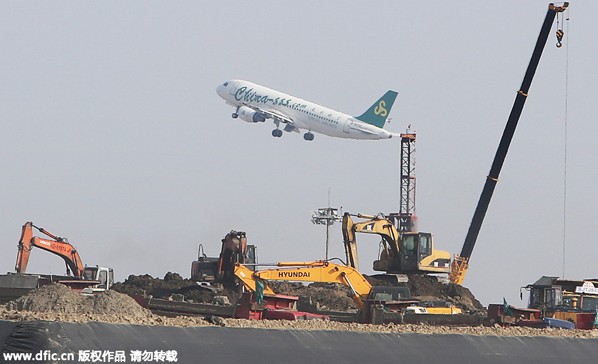China plans to build 66 new airports over the next five years says Dong Zhiyi, a Deputy Director of the Civil Aviation Administration of China (CAAC). The expansion will raise the number of airports in mainland China from 206 to 272.
The massive infrastructure undertaking will not be cheap. To help cover the costs, China plans to invest upwards of 77 billion yuan ($11.7 billion) on civil aviation infrastructure this year alone. The investment will support eleven key infrastructure projects and 52 upgrades on civil aviation facilities, including work on new airports in Beijing, Chengdu, Qingdao, Xiamen, and Dalian.
See Also: New Beijing Airport to Open in 2019
Construction of Beijing’s second international airport is scheduled to be completed in June 2019. Work on the airport’s terminal and air traffic control facilities began last September, while construction of other support buildings is expected to start June of this year. Located to the south of the capital, Beijing New Airport will be the largest in the country. The airport will have seven runways and process some 72 million passengers a year.
Meanwhile, a new runway being built at the existing Beijing Airport, is anticipated to help accommodate an additional 8 million passengers a year.
Citing a rise in air travel that saw Chinese take 4 billion domestic trips and over 100 million international trips last year, the CAAC plans to not only increase the number of airports but also the number of domestic and international routes.
Xu Hongjun, a professor at the Civil Aviation University of China, admits that the expansion of airports in China is not good for everyone. “A lot of small airports are not doing well. They need a lot of subsidies from the central government. They were too optimistic,” said Xu. Perhaps the best example is the airport in Libo, Guizhou. Following the completion of construction in 2007 at a cost of $57 million, the airport made headlines after receiving only 151 passengers in all of 2009.
Compounding the problem is the fact that Chinese airlines have been rated as some of the worst in the world, and that Chinese passengers normally have to endure numerous flight delays when traveling in China. Domestically, Chinese airlines are also facing increased competition from the country’s high-speed rail network, which offers passengers a more affordable way to travel within China.


